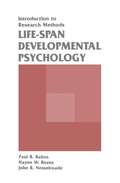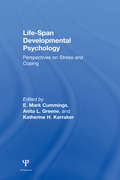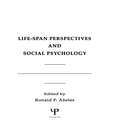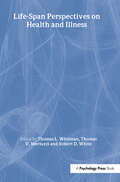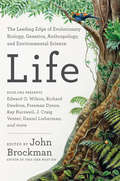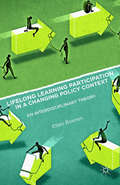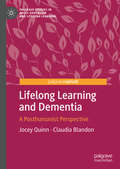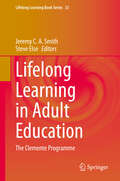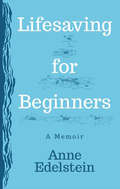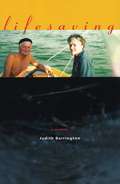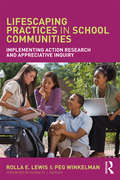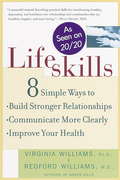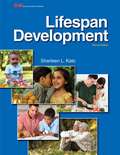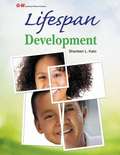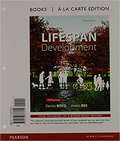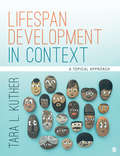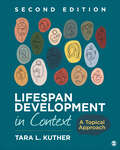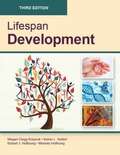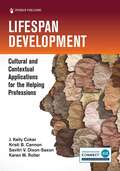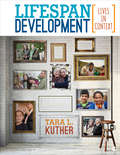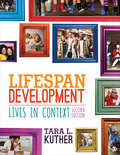- Table View
- List View
Life-span Developmental Psychology: Introduction To Research Methods
by Hayne W. Reese Paul B. Baltes John R. NesselroadeWhat are the changes we see over the life-span? How can we explain them? And how do we account for individual differences? This volume continues to examine these questions and to report advances in empirical research within life-span development increasing its interdisciplinary nature. The relationships between individual development, social context, and historical change are salient issues discussed in this volume, as are nonnormative and atypical events contributing to life-span change.
Life-span Developmental Psychology: Perspectives on Stress and Coping
by E. Mark Cummings Anita L. Greene Katherine H. KarrakerAlthough there has been a significant increase in studies of stress and coping processes in recent years, researchers have often approached these topics from rather narrow and constrained perspectives. Furthermore, little communication has occurred across disciplines and research directions, resulting in the emergence of several relatively isolated literatures. An outgrowth of the Eleventh Biennial West Virginia University Conference on Life-Span Development, this volume emphasizes two major themes: the importance of taking a life-span approach to the study of stress and coping, and the development of new and more complete conceptual models of stress and coping processes. The first to approach these subjects from a life-span perspective, this book includes papers by distinguished researchers from each of the major periods of the life-span, and brings together the cognitive and socioemotional traditions in the study of dealing with pressures. The editors hope that this facilitation of communication among researchers with diverse views will help create a broadening and integration of perspectives.
Life-span Perspectives and Social Psychology
by Ronald P. AbelesFirst published in 1987. Routledge is an imprint of Taylor & Francis, an informa company.
Life-span Perspectives on Health and Illness
by Thomas L. Whitman Thomas V. Merluzzi Robert D. WhiteThis volume offers a comprehensive and conceptually integrated overview of the changing biological, psychological, and social/environmental influences on health and illness from the prenatal period through infancy, childhood, adolescence, and adulthood. Based on the premise that protective and risk factors vary with life stage, several chapters examine the development of major biological systems and the changing role of genetics and environment over time. In addition, they provide information on environmental influences during the prenatal period and early childhood, chronic illness in childhood, and health and health risks in adolescence. Chapters on adulthood give special emphasis to mid-life transitions in health, resiliency in later life, and the impact of caregiving on health. Final chapters focus on death and dying and on an integrative model of health and illness across the life span.
Life: The Leading Edge of Evolutionary Biology, Genetics, Anthropology, and Environmental Science
by Mr John BrockmanThe newest addition to John Brockman's Edge.org series explores life itself, bringing together the world's leading biologists, geneticists, and evolutionary theorists--including Richard Dawkins, Edward O. Wilson, J. Craig Venter, and Freeman Dyson.Scientists' understanding of life is progressing more rapidly than at any point in human history, from the extraordinary decoding of DNA to the controversial emergence of biotechnology. Featuring pioneering biologists, geneticists, physicists, and science writers, Life explains just how far we've come--and takes a brilliantly educated guess at where we're heading.Richard Dawkins and J. Craig Venter compare genes to digital information, and sketch the frontiers of genomic research.Edward O. Wilson reveals what ants can teach us about building a superorganism--and, in turn, about how cells build an organism. Elsewhere, David Haig reports new findings on how mothers and fathers individually influence the human genome, while Kary Mullis covers cutting edge treatments for dangerous viruses. And there's much more in this fascinating volume.We may never have all the answers. But the thinkers collected in Life are asking questions that will keep us dreaming for generations.
Lifelong Learning Participation in a Changing Policy Context: An Interdisciplinary Theory
by Ellen BoerenDrawing on the role of individuals, education and training providers and countries' social policy actions, and borrowing insights from psychology, sociology and economics, this book works towards an interdisciplinary theory of adult lifelong learning participation. It explores the fragmented evidence of why adults do or do not participate in adult lifelong learning activities and focuses on the relevance of policy, the social character and expected benefits of lifelong learning participation and discusses the potential implications for policy, practice and research.
Lifelong Learning and Dementia: A Posthumanist Perspective (Palgrave Studies in Adult Education and Lifelong Learning)
by Jocey Quinn Claudia BlandonThis book explores the potential for lifelong learning in dementia. A growing social issue, dementia has previously been understood as a wasteland for learning: at best, those with dementia are helped to hold on to some pre-existing skills. This book draws on extensive qualitative data with people with dementia and their families to demonstrate that new forms of learning can happen in dementia, with positive outcomes for both the learner and those around them. In doing so, this book demonstrates that those with dementia help us to understand learning differently, thus providing a breakthrough in our understanding and theorising of lifelong learning. Using posthuman theory to scaffold and discuss the findings, this pioneering book will appeal to scholars of dementia, lifelong learning and the posthuman.
Lifelong Learning in Adult Education: The Clemente Programme (Lifelong Learning Book Series #33)
by Jeremy C. A. Smith Steve ElseThis academic book delves into the powerful impact of the Clemente program in Australia, focusing on individuals facing various disadvantages. Through partnerships with community organisations, municipal governments, and human service organizations – the Australian Catholic University and, in Ballarat, Federation University Australia – the program offers a comprehensive Humanities course at multiple locations across the country. The twelve-week curriculum includes expert lectures by Tertiary educators and interactive sessions with Learning Partners, fostering critical thinking and meaningful engagement with society. At the core of the Clemente Program lies a strong belief in the transformative power of education, particularly in the Humanities. It aims to empower those who feel disconnected from society by promoting social inclusion and building self-confidence through knowledge and reflection. The essays in this book, written by respected academics, cover various topics, such as regional implementation, emotional intelligence research, the program's impact on disadvantaged youth, experiences of vulnerable individuals, its teaching approach compared to other university courses, and the effects of trauma on learning. This scholarly work sheds light on the life-changing potential of the Clemente Program in Australia. It highlights how education in the Humanities can empower individuals facing disadvantages and create stronger communities.
Lifesaving for Beginners: A Memoir
by Anne Edelstein“[The author] tells the story of how her mother’s unexpected death forced her to come to terms with a tragic family past . . . A poignantly candid memoir.” —Kirkus ReviewsWhen Anne Edelstein was forty-two, her mother, a capable swimmer in good health, drowned while snorkeling in the Great Barrier Reef. Caring for two children of her own, Anne suddenly found herself grieving not only for her emotionally distant mother but also for her beloved younger brother Danny, who’d killed himself violently years before—and wrestling with the past and her family’s legacy of mental illness as well as the emotional well-being of her children. Part memoir and part meditation on joy and grief, Lifesaving for Beginners will resonate with anyone who’s struggled to come to terms with their family and their place in the world.“While dramatic events set this memoir in motion, the triumph of Lifesaving for Beginners is that its heart lies not in the large ruptures of life but in the reconciliations that arrive quietly and routinely. I admire—and envy—the writing in this book. Its smooth surface belies its depths, much like the open waters Edelstein swims in as she seeks her own calmness and consolation.” —Kathleen Finneran, author of The Tender Land“An unforgettable—and unputdownable—portrait of a singular American family. Reminiscent of Vivian Gornick’s Fierce Attachments and Daphne Merkin’s This Close to Happy.” —Joanna Rakoff, author of My Salinger Year“[This book] is indeed a lifesaver.” —Mark Epstein, author of Going to Pieces without Falling Apart
Lifesaving: A Memoir
by Judith BarringtonA new memoir from the author of the popular Writing the Memoir: From Truth to Art. Beginning with her parents in England, she writes of their move to Spain, back to England, her parents' death at sea, and her grief after that. Barrington moves to Spain herself, and this is what she wrote of that time.
Lifescaping Practices in School Communities: Implementing Action Research and Appreciative Inquiry
by Rolla E. Lewis Peg WinkelmanLifescaping Practices in School Communities is a guide for school administrators and helping professionals (school counselors, school psychologists, school social workers, and other stakeholders) looking to promote relational wellness and student success in their school. This informative new resource will introduce readers to an ecological approach by using action research and appreciative inquiry to guide and engage school-wide change. Also offered are first-hand models of conceptual lifescaping projects using action research and appreciative inquiry by first-time practitioners from different school communities.
Lifeskills: 8 Simple Ways to Build Stronger Relationships, Communicate More Clearly, and Improve Your Health
by Redford WilliamsHere are the eight skills this book will help you master: 1. Identify your thoughts and feelings: how to tap into your feelings, especially the negative ones 2. Evaluate your negative feelings, negative thoughts, and options: how to decide when to take action 3. Communicate better: how to be a more effective listener and speaker 4. Empathize with others to understand their behavior: how to appreciate a situation from someone else's point of view 5. Do problem-solving: how to define the problem, generate alternatives, and evaluate the outcomes 6. Practice assertion: how to get others to do what you want 7. Practice acceptance: how to back off without feeling like a failure 8. Emphasize the positive: how to build better relationships using a proven ratio of positive to negative interactions. Lifeskills shows how building better relationships is an essential part of preserving health--and offers eight clear steps anyone can use to make that happen.
Lifespan Development
by Sharleen L. KatoLifespan Development is the first textbook on this topic to be targeted to the high school student. In it, students learn about the different stages of development that people pass through as they age. From newborn to older adulthood, people continue to develop and change physically, cognitively, socially, and emotionally. Features covering cultural diversity, health, and safety are included throughout the text. Core Skills activities reinforce writing, speaking, math, and career readiness skills. * The developmental theories of Erikson, Piaget, Vygotsky, and Kohlberg are highlighted. * A unit is dedicated to career paths in education and training and human services. * Case studies are included in every chapter to help students relate classroom learning to the real world.
Lifespan Development
by Sharleen L. KatoNIMAC-sourced textbook <p><p> Lifespan Development is designed to help your students understand human growth and development across the lifespan. The text shows that all people go through similar stages of development. Young children learn to walk, talk, spell, jump, and tell jokes. Teens learn to become more independent. Adults take on more responsibilities for themselves and others. Throughout the lifespan, people continue to develop and change physically, cognitively, socially, and emotionally. The text also includes strategies that promote lifespan health and wellness.
Lifespan Development (7th Edition)
by Helen L. Bee Denise G. BoydLifespan Development, 7/e by Denise G. Boyd and Helen L. Bee thoroughly and accessibly addresses the most critical concepts of development. Through their engaging writing style, the authors have made more abstract material about developmental theories approachable to students. Readers will appreciate both the applied nature of this title and the clarity of the authors' presentation of current research. Students will emerge from your course with a thorough understanding of developmental science and will be able to apply this understanding to their own lives.
Lifespan Development in Context: A Topical Approach
by Tara L. KutherAward-winning author Tara L. Kuther presents Lifespan Development in Context, a topically organized version of her bestselling Lifespan Development text that provides a panoramic view of the many influences that shape human development. Kuther’s student-friendly narrative guides the reader through immersive video cases and real-world examples to illustrate how the places, sociocultural environments, and ways in which we are raised influence who we become and how we grow and change throughout our lives. Three core themes resonate throughout each chapter: the centrality of context, the importance of research, and the value of applied developmental science. Foundational theories and classic studies are combined with contemporary research and culturally diverse perspectives for a modern introduction to the field that is both comprehensive and concise. Visual overviews, case studies, and critical thinking questions encourage self-reflection and class discussion, ensuring students have the tools they need to apply course concepts to their lives and future careers.
Lifespan Development in Context: A Topical Approach
by Tara L. KutherAward-winning author Tara L. Kuther presents Lifespan Development in Context, a topically organized version of her bestselling Lifespan Development text that provides a panoramic view of the many influences that shape human development. Kuther’s student-friendly narrative guides the reader through immersive video cases and real-world examples to illustrate how the places, sociocultural environments, and ways in which we are raised influence who we become and how we grow and change throughout our lives. Three core themes resonate throughout each chapter: the centrality of context, the importance of research, and the value of applied developmental science. Foundational theories and classic studies are combined with contemporary research and culturally diverse perspectives for a modern introduction to the field that is both comprehensive and concise. Visual overviews, case studies, and critical thinking questions encourage self-reflection and class discussion, ensuring students have the tools they need to apply course concepts to their lives and future careers.
Lifespan Development in Context: A Topical Approach
by Tara L. KutherAward-winning author Tara Kuther presents Lifespan Development in Context, Second Edition, a topically oriented edition of her bestselling text that provides a panoramic view of the many influences that shape human development. Kuther′s student-friendly narrative illustrates how the places, sociocultural environments, and ways in which we are raised influence who we become and how we grow and change throughout our lives. Three core themes resonate throughout each chapter and across each developmental domain and topic: the centrality of context, the importance of research, and the applied value of developmental science. Foundational theories and classic studies are woven together with contemporary research and culturally diverse perspectives for a full, updated introduction to the field that is both comprehensive and concise. Case studies, real-world applications, and video examples ignite critical thinking and class discussion, ensuring students have the tools they need to apply course concepts to their lives and future careers.
Lifespan Development in Context: A Topical Approach
by Tara L. KutherAward-winning author Tara Kuther presents Lifespan Development in Context, Second Edition, a topically oriented edition of her bestselling text that provides a panoramic view of the many influences that shape human development. Kuther′s student-friendly narrative illustrates how the places, sociocultural environments, and ways in which we are raised influence who we become and how we grow and change throughout our lives. Three core themes resonate throughout each chapter and across each developmental domain and topic: the centrality of context, the importance of research, and the applied value of developmental science. Foundational theories and classic studies are woven together with contemporary research and culturally diverse perspectives for a full, updated introduction to the field that is both comprehensive and concise. Case studies, real-world applications, and video examples ignite critical thinking and class discussion, ensuring students have the tools they need to apply course concepts to their lives and future careers.
Lifespan Development, Third Edition (paperback-4c)
by Kelvin Seifert Robert Hoffnung Michele Hoffnung Megan Clegg KraynokLifespan Development, Third Edition (paperback-4c)
Lifespan Development: A Psychological Perspective
by Martha Lally and Suzanne Valentine-FrenchDevelopmental psychology allows for ease of modularity, and this text uses a chronological lifespan format. The book was organized in the typical developmental psycology chronological format and then further broken down within each chapter by developmental domain: physical, cognitive, social.
Lifespan Development: Cultural and Contextual Applications for the Helping Professions
by J. Kelly CokerProvides fundamental knowledge while challenging readers to question, evaluate, and consider contextual factors when applying developmental theories. <P><p> This unique and refreshing text imbues lifespan development theories, concepts, and research with unaccustomed energy and life―while meeting the rigorous academic standards required for accreditation in the helping professions. Going beyond mere memorization, the book illuminates the contextual and cultural dimensions of human development by underscoring current and relevant research; considering the racial, social, and economic factors that impact human development; offering the perspectives of a broad spectrum of esteemed helping professionals; and incorporating case studies, podcasts, vivid graphics, and interactive activities. <P><p> Highlighting the ways in which developmental theories are applicable to contemporary life, the text uses case studies to demonstrate how clinicians can use their knowledge of development to support client growth, the expertise of multidisciplinary health professionals to highlight different developmental theories and approaches, and analyzes foundational theories against a backdrop of current research that factors in contextual and cultural dimensions. These include a focus on racial and social inequality, social media, children with special needs, persons with disabilities, poverty, and development in time of pandemic. Chapters are organized by lifespan development phases and begin with a case study emphasizing cultural and contextual considerations followed by relevant theories and models to conceptualize the particular phase. Supportive teaching tools include Instructor's Manual, PowerPoints, and Test Bank. Purchase includes digital access for use on most mobile devices or computers. <P><p> Key Features: <P>• Delivers engaging approach to lifespan development while maintaining strict academic standards <P>• Illuminates the contextual and cultural dimensions of human development by underscoring contemporary research <P>• Offers the perspectives of multidisciplinary experts who highlight varied theories and approaches <P>• Written by authors of different ages, cultural backgrounds, and professional identities to ensure diverse, culturally responsive perspectives <P>• Provides podcasts for most chapters from experts focusing on cultural and contextual dimensions of specific theories <P>• Uses student reflection boxes to focus on specific and current factors impacting development <P>• Includes abundant graphics, interactive activities, and links to outside resources to reinforce learning
Lifespan Development: Lives in Context
by Dr Tara L. KutherRecipient of the 2017 Most Promising New Textbook Award from the Textbook & Academic Authors Association (TAA) Chronologically organized, Lifespan Development: Lives in Context offers a unique perspective on the field by focusing on the importance of context—examining how the places, sociocultural environments, and ways in which we are raised influence who we become and how we grow and change. Author Tara L. Kuther integrates cutting-edge and classic research throughout the text to present a unified story of developmental science and its applications to everyday life. Robust pedagogy, student-friendly writing, and an inviting design enhance this exciting and inclusive exploration of the ways in which context informs our understanding of the lifespan.
Lifespan Development: Lives in Context
by Dr Tara L. KutherRecipient of the 2017 Most Promising New Textbook Award from the Textbook & Academic Authors Association (TAA) Chronologically organized, Lifespan Development: Lives in Context offers a unique perspective on the field by focusing on the importance of context—examining how the places, sociocultural environments, and ways in which we are raised influence who we become and how we grow and change. Author Tara L. Kuther integrates cutting-edge and classic research throughout the text to present a unified story of developmental science and its applications to everyday life. Robust pedagogy, student-friendly writing, and an inviting design enhance this exciting and inclusive exploration of the ways in which context informs our understanding of the lifespan.
Lifespan Development: Lives in Context
by Dr. Tara L. KutherHow does context impact human growth and development? Do the places, sociocultural environments, and ways in which we are raised influence who we become and how we grow and change throughout our lives? Tara L. Kuther helps students discover the answers with Lifespan Development: Lives in Context, Second Edition. Taking a chronological approach, the textbook follows three core themes: the centrality of context, the importance of research, and the applied value of developmental science. Dr. Kuther’s clear, concise narrative guides students through current and classic studies and foundational theories while exploring real-world connections and culturally diverse perspectives. Case studies, policy applications, and other examples are accompanied by opportunities for personal reflection to help students carry these discoveries into their own lives and future careers.
